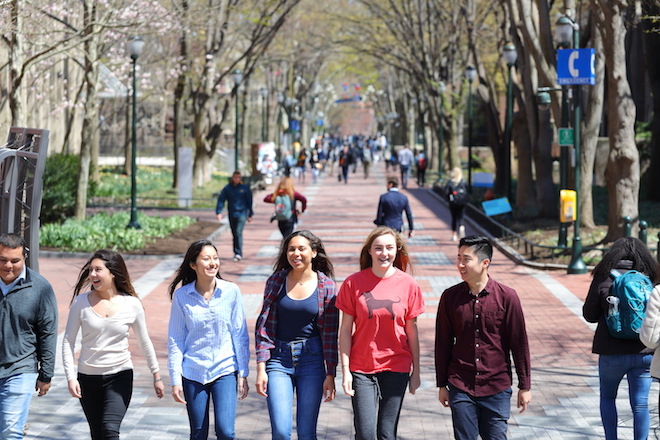
COVID-19 has introduced uncertainty into seemingly every part of our lives. When I, like students around the world, was abruptly sent home in March, it seemed like no aspect of my life had been untouched by the pandemic. Whatever plans I might have had—be it successfully completing classes, having fun with my friends, or planning exciting events for my student organizations — had been thrown out the window.
Ultimately, the way I approached my day-to-day life needed some major adjustment—and landing a summer internship was no different.
I had halfheartedly begun the internship search my sophomore fall. I would randomly apply to jobs that seemed like they could be interesting, without fully understanding the role or what taking the time to really think about what I was interested in. I felt no rush to figure it out. I was working my way through many of Wharton’s core classes—Marketing, Management, Finance, and Accounting to name a few—and was confident I would end the semester with some sort of direction for my interests. I had given myself the arbitrary deadline of Spring Break to ensure that I had internship plans sorted out.
Then COVID-19 hit.
TAKE WHAT YOU CAN GET
My internal struggle was amplified by the exogenous circumstances of a pandemic and economic recession. Any degree of pickiness I felt entitled to during the internship search was trumped by my initial panic to find something – anything – as quickly as possible. I took every interview opportunity that came my way and got in touch with numerous Wharton alum to see if anyone was hiring. I was looking everywhere—tech startups, investment banks, marketing agencies, consulting firms, government agencies. Time after time, I was met with a response along the lines of, “Thanks for getting in touch with us. We’re not sure what we’re doing regarding our scheduled summer programming since we are prioritizing other things at the moment, but we will definitely keep you in mind for future years.”

Ana Singhal
Initially, I was frustrated and worried that nothing would pan out. In reality, the situation gave me the time and the push I needed to actually think about my interests. I finally tried to focus my energy in one area, something I was failing to do even in the pre-pandemic world. Ultimately, it made all the difference.
After focusing my job search efforts on areas related to Finance, I interviewed with a Real Estate Private Equity firm where I felt like my learning experience would be prioritized. Like many of other companies I spoke to, they were scrambling during March, so I had to learn to balance persistence with patience. I followed up politely every few weeks to continually express my interest. After a couple months of this, they were able to offer me a four-week internship. After hearing from many of my friends that their internships had been cancelled, I jumped at the opportunity, even if it was going to be a lot shorter than I would have preferred.
EVERYONE FACING THE SAME ISSUES
I also had my reservations about working in the commercial real estate industry given that people were retreating from office buildings, fleeing from their apartments in densely populated areas, pausing all construction efforts for the foreseeable future, and avoiding hospitality hubs. In reality, the unusual circumstances made this an unparalleled learning opportunity. There were more macro discussions of the industry occurring than ever led by think tanks, brokerages, and industry experts. I was able to gain a much better grasp on the industry as a whole than I would be able to under normal circumstances.
My projects were also incredibly interesting—looking into target markets and examining how COVID-19 was affecting different asset classes or looking into new investment strategies. In an attempt to gain as much knowledge and experience as possible out of the short duration of my internship, I made every effort possible to be useful to the team. This meant asking for extra work to do in my down time, offering to attend and take notes on webinars for the whole team, and taking the time to go above-and-beyond on every task I was given. As a result of my diligence, I was asked to stay on for an additional month because I had managed to be much more helpful than expected.
While I would have loved to work in a physical office, there were a lot of important lessons that came from trying to be useful as an intern in a virtual environment. I learned to be ambitious yet empathetic, not only in the job search but also in my day-today tasks. At the end of the day, everyone was making major adjustments to their personal and professional lives as a result of the pandemic. People were operating across different time zones or trying to balance work with having their children at home.
BECOMING THE INDISPENSIBLE INTERN

Wharton students. Courtesy photo
Understanding that it’s simply more challenging to have the same level of interaction I might have in an office setting, I also learned how to troubleshoot and problem-solve on my own when I knew I might not get a prompt response to my email or text. For example, if I had a quick question that needed to be resolved before I could keep working on a task, that that would warrant a text or email. If I found that I was struggling a with a task – such as pulling the right data to calculate certain metrics in a research report – I would take note of the questions I had and move on to another task. I knew that a phone call would be much more effective in resolving these issues.
The most important lesson I took from this summer, one that undoubtedly transcends the context of a pandemic, is that you get out of every work experience what you put into it. In retrospect, I could have easily coasted through my four weeks. Instead, I committed to making the most of the experience, being as helpful as possible. I was able to make a meaningful difference to the firm by being able to look into and report on trends in the industry that others at the firm lacked the time to research in detail.
Despite the unique learning experiences that came from working virtually and during these unprecedented times, I do hope that my future internships and work experiences will be in-person. The camaraderie, community, and collaboration that take place in an office is not something that can be replicated online, especially for young professionals joining organizations where they have yet to meet anyone. That being said, I am grateful to have had an internship at all. Learning to succeed in a virtual environment was a unique challenge—and I am thankful for all of the ways it pushed me to hone in on my interests, take advantage of leveraging Wharton’s network, and learn to contribute meaningfully to a workplace even in these less-than-ideal circumstances.
My name is Ana Singhal and I am a junior at the Wharton School from Columbus, Indiana. I have yet to decide on a concentration, but have particularly enjoyed studying Statistics, Marketing, and Health Care Management so far. On campus, I am involved in Wharton Ambassadors, Wharton Women, and am a research assistant. In my free time, I enjoy running and exploring Philly.
DON’T MISS: WHARTON WISDOM: COMING TO TERMS WITH A SEMESTER DISRUPTED or WHARTON WISDOM: EXPECTATIONS VS. REALITY AT WHARTON or WHARTON WISDOM: LESSONS FROM WHARTON STUDENTS’ FAVORITE CLASS











Questions about this article? Email us or leave a comment below.